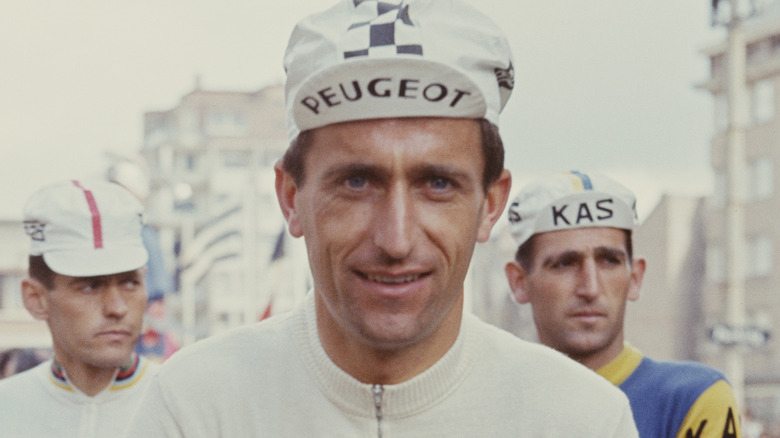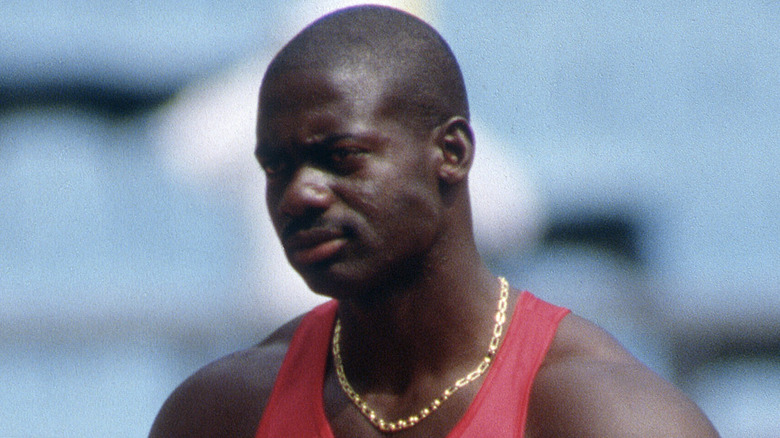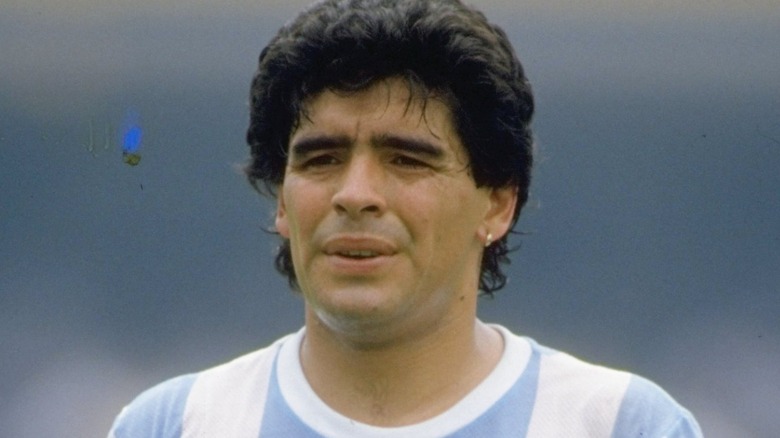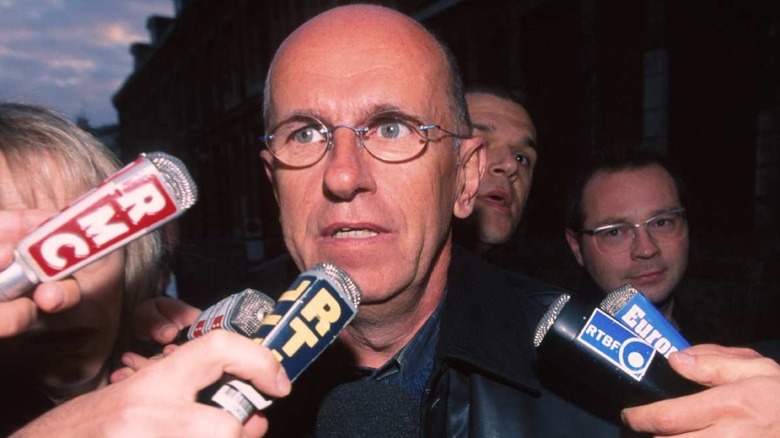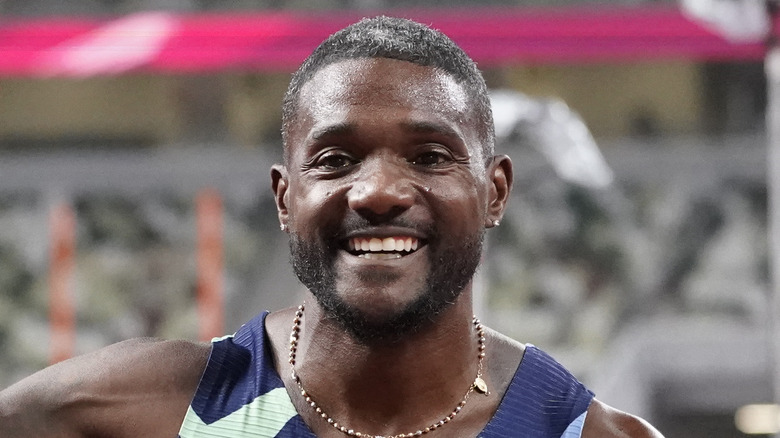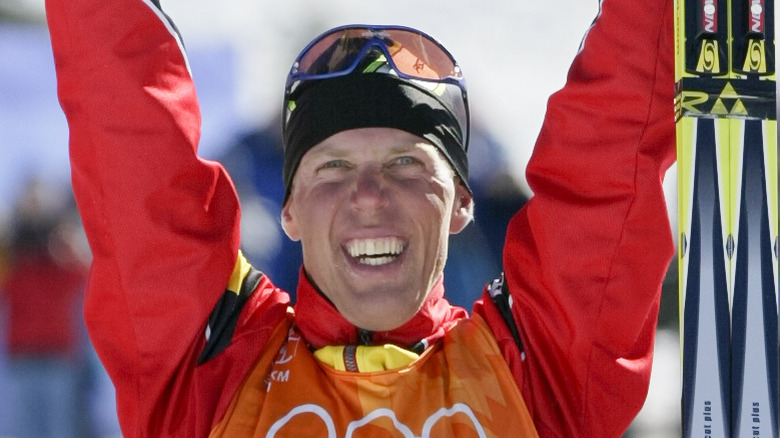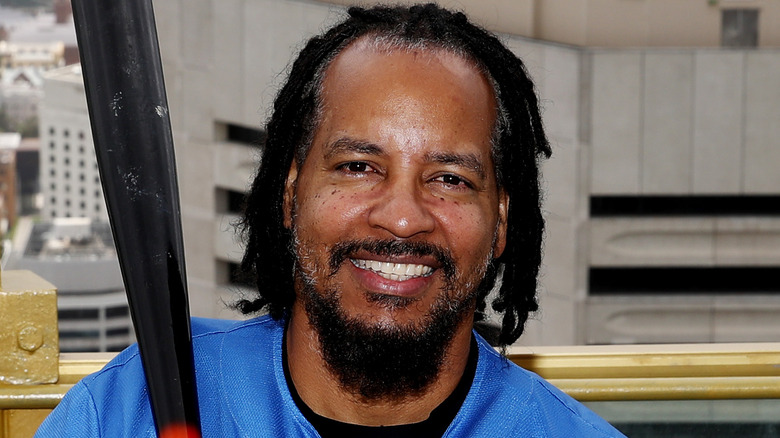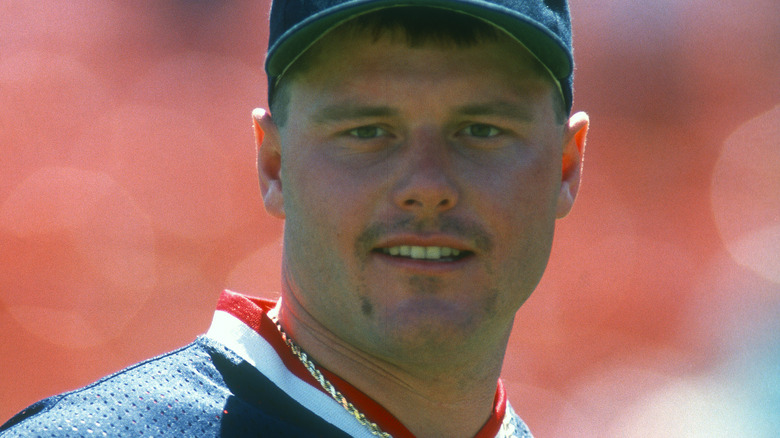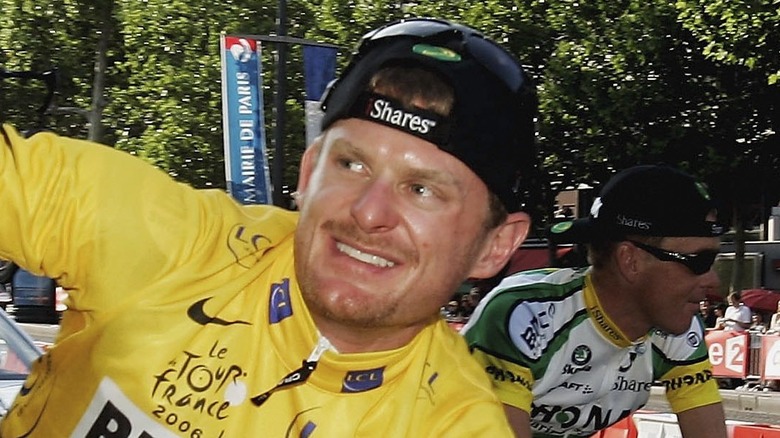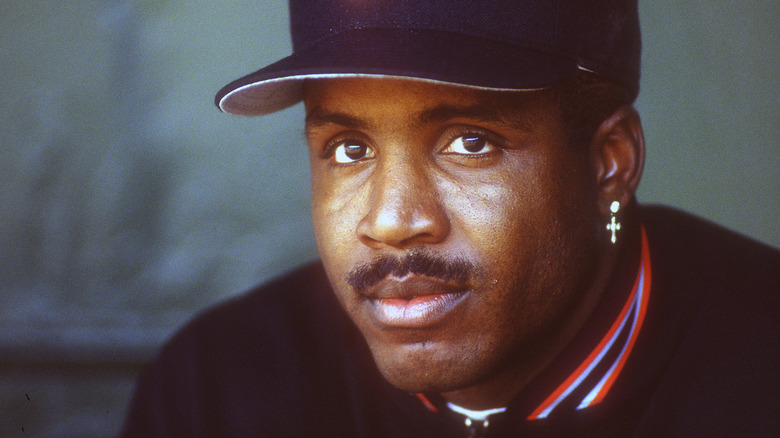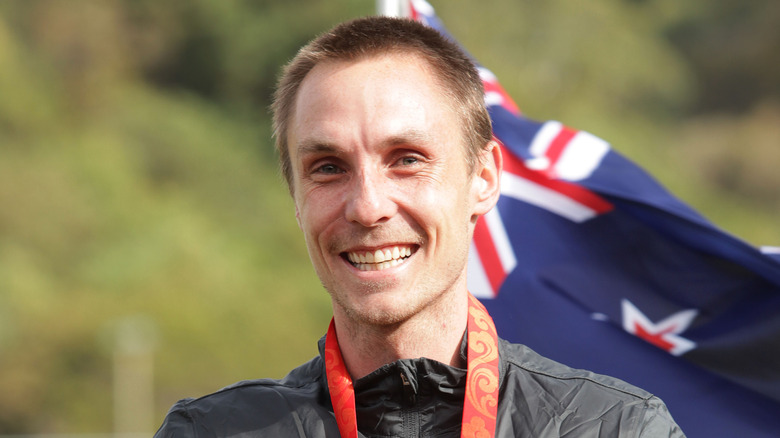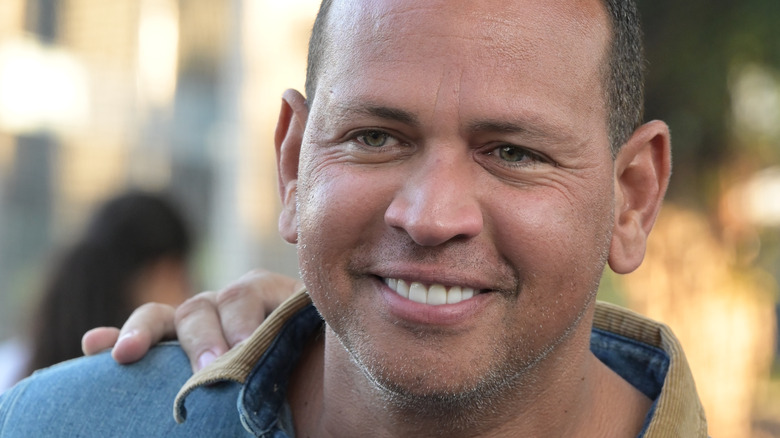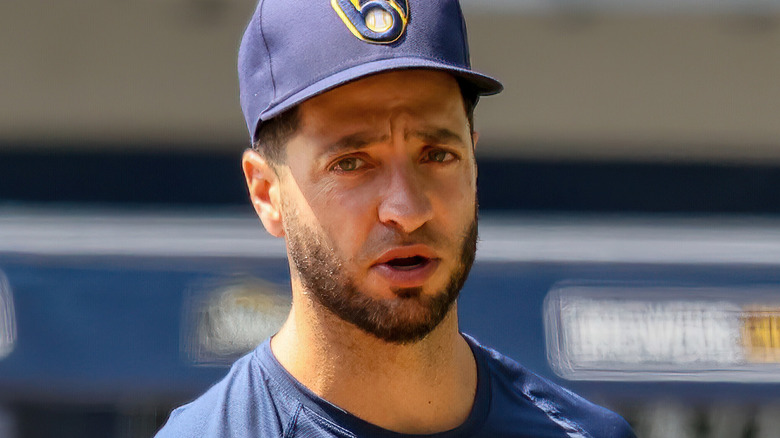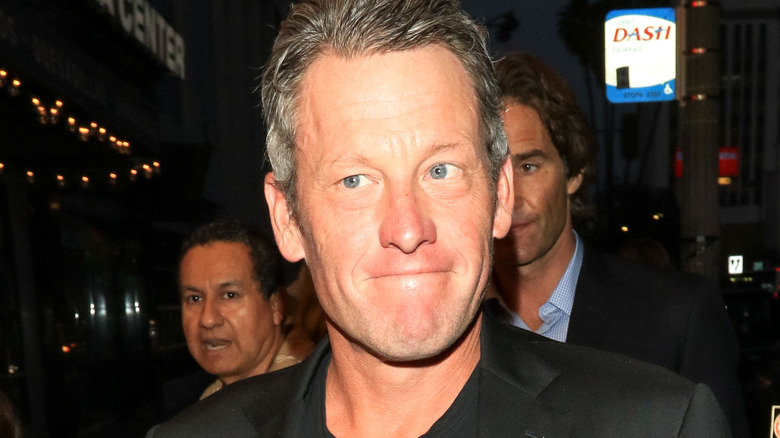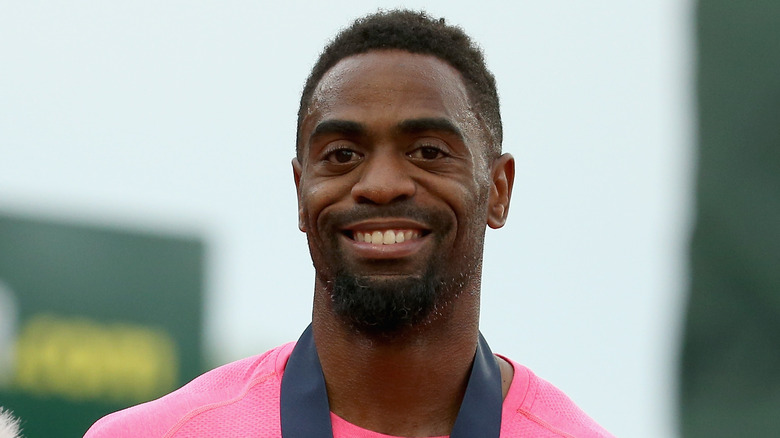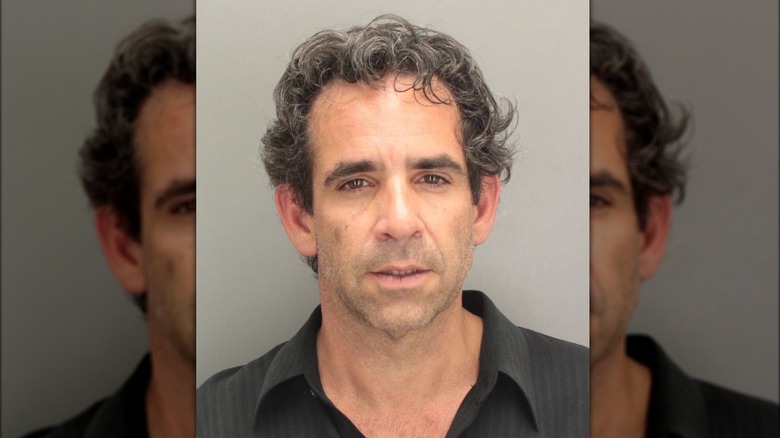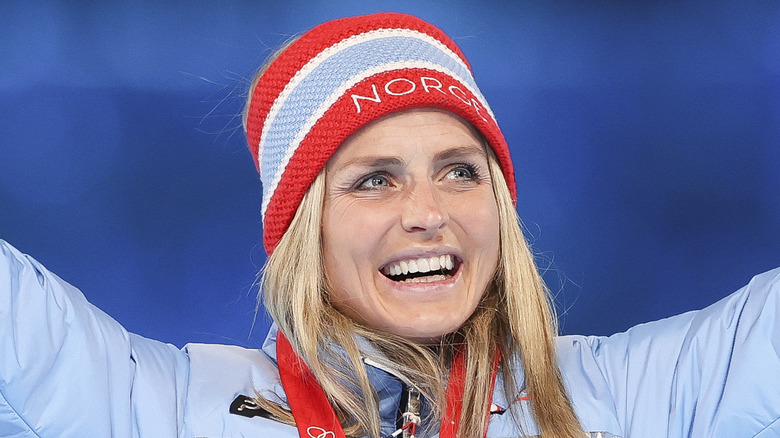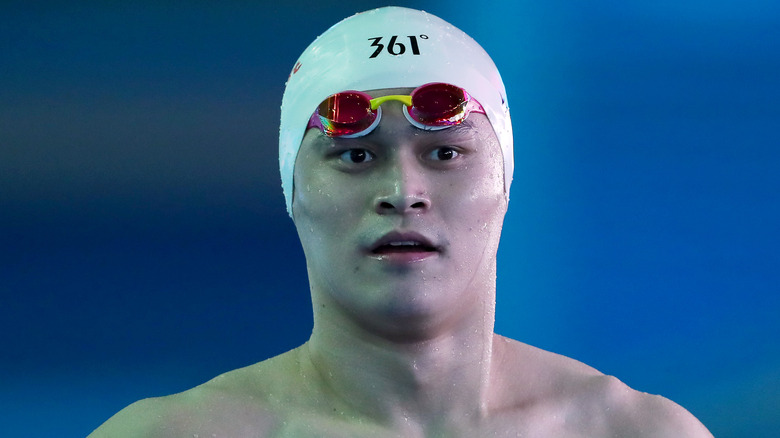25 Athletes Who Got Caught Doping
The following article includes descriptions of substance abuse.
Modern sports often require athletes to undergo drug testing for a variety of substances. Everything from human growth hormones and steroids to performance-enhancing drugs and other stimulants can give athletes the edge they need to win. Of course, it's also considered cheating and can cost an athlete their medals, titles, and career. Doping, in one form or another, is nothing new – athletes have been using substances to enhance their abilities for centuries.
Regulators in sports didn't begin officially testing for doping until the 1960s. Since then, athletes have had to pee in a cup or give blood to ensure they aren't taking anything forbidden, and the list of substances they must avoid is long. Athletes caught doping include those who claimed that they unknowingly used a banned substance and plenty who knew what they were doing. While some managed to turn their career around after doping scandals, others didn't, and these althetes' reputations remain forever marred in the annals of sports history.
Tom Simpson died during the Tour de France
British cyclist Tom Simpson was once one of the biggest names in the biking sport, having earned a bronze medal at the 1956 Olympics and excelling at other international competitions. Simpson won the Tour de Flanders in 1961, the World Road Race Championships in 1965, and many other significant titles throughout his career.
Sadly, his career and life abruptly ended while cycling in the 1967 Tour de France. While ascending Mont Ventoux, Simpson collapsed and died at the age of 29. According to eyewitness accounts, Simpson faltered and fell over on the side of the road. He remounted his bike with some help, but fell a second time. Initially, Simpson's death was deemed due to the excess heat and steep ascent, but the post-mortem examination found mixed amphetamines and alcohol in his system, which produced a powerful diuretic combination.
The excess heat combined with the substances in his system proved too much, resulting in Simpson's death. Simpson took PEDs throughout his career (as was common at the time), but it wasn't against the rules — his death changed that. According to the Olympics website, Simpson's death was a catalyst for the Olympics and other international organizations' establishment of anti-drug regulations. Despite the manner of his death, Simpson is highly regarded in the cycling world and is remembered fondly by his fans as one of the greatest cyclists ever to compete.
Ben Johnson lost his Olympic gold medal
Jamaican-born Canadian sprinter Ben Johnson was once one of the world's fastest man. He won numerous medals throughout his career, including two bronze medals at the 1984 Olympics and several gold medals at the Goodwill Games, Commonwealth Games, World Cup, and more. In 1988, Johnson represented Canada at the Summer Olympics, winning the gold in the 100-meter final and even beating the world record he had set himself.
Unfortunately, Johnson was stripped of that honor when regulators found anabolic steroids in his system. Three days after the race, the Olympic Doping Control Center discovered Johnson's urine test came back positive for stanozolol. The Olympics then stripped the sprinter of his gold medal, and things only worsened from there. Johnson later admitted to taking steroids the previous year, costing him a record-breaking run he earned at the 1987 World Championships and the 1987 World Indoor Championships.
Due to the international press attention from this scandal, Johnson's name and career are forever linked to his use of steroids, and the ensuing investigation revealed how prevalent PEDs and other substances dominated the sport. Johnson himself has since moved on, explaining in a statement: "I have moved past the events of 1988 and am enjoying a full life with family and trusted friends — I have not allowed that time in my life to define me. It is just unfortunate that some in the media and in the bureaucracy of sport still feel a need to vilify me." (via CBC Sports).
Diego Maradona was eliminated from the World Cup and suspended
Diego "The Golden Boy" Maradona is one of those names that remain forever associated with the world of soccer, as many regard him as one of the best players in the history of the game. Throughout his impressive career, Maradona broke records, played in multiple World Cups, and established himself as one of the greats. Maradona received the FIFA Player of the 20th Century award, an honor he shared with Pelé.
While Maradona's cocaine use in the 1980s caused personal and legal troubles for the star player, another drug earned him a suspension from an important competition. Maradona was barred from participating in the 1994 World Cup after FIFA found ephedrine – a stimulant that was and remains banned in professional soccer — in his system. He tried to claim that he took over-the-counter sinus medication that contained ephedrine, but no OTC drug had the cocktail of ephedrine variants that was discovered in his body.
"They have retired me from soccer. I don't think I want another revenge, my soul is broken," Maradona told Channel 13 of Buenos Aires (via The New York Times) in 1994. Post-scandal, Maradona went on to become a coach for the Argentinian national team and a manager after his playing career ended. He died in 2020 at the age of 60 from a heart attack due to alleged medical negligence, resulting in homicide and related charges for eight healthcare workers.
The 'Tour of Shame' doping scandal cut the competition in half
Since the establishment of anti-doping policies in the late 1960s, several incidents of teams and laboratory doping scandals dominated the headlines. In 1998, the headlines focused on the Festina Cycling Team, which was suspended en masse from competing in the Tour de France. The Festina affair arose after customs officials stopped Festina soigneur Willy Voet at the Belgian border with France. They found a plethora of doping products, steroids, 235 doses of the PED erythropoietin, and other incriminating evidence in his car.
This happened shortly before the race began, and every member of the Festina cycling team had to sit it out. The ensuing investigation found a systemic doping strategy in various teams, leading the 1998 Tour de France to be dubbed the "Tour of Shame." At the time, Festina was the world's No. 1 ranked team, and nobody involved competed in the infamous race.
Only 96 of the original 189 contestants remained in the Tour de France once the race made it to Paris. Various confessions and incriminations removed half of all riders and six teams, resulting in some of them receiving criminal charges involving drug trafficking. The following year, the scandal's impact was evident with the establishment of the World Anti-Doping Agency. This governing regulatory body coordinates anti-doping rules across multiple competitive sports across all nations competing in world athletics.
Andreea Răducan took PEDs provided by her team doctor
In 2000, gymnast Andreea Răducan was at the top of her game, having won the gold at numerous World Championships and the 2000 World Cup. Răducan competed in the 2000 Summer Olympics in Sydney and represented her native Romania, winning the silver on the vault, helping her team with the gold, and winning the gold in the all-around competition.
In a turn of events, the International Olympic Committee stripped Răducan of her all-around win after she failed doping controls due to the presence of pseudoephedrine – one of many banned stimulants and an ingredient in many cold medicines — in her system. The Romanian team doctor prescribed the medication to Răducan, and according to the athlete and her coaches, it neither impacted her performance nor did she know she had ingested a banned substance. Răducan took the over-the-counter cold medication, Nurofen, a few hours before competing to treat a cough and fever.
Răducan appealed the IOC's decision to the Court of Arbitration for Sport later that year. The court upheld the IOC's decision, keeping Răducan's gold medal from her, in an effort to respect the Olympics' anti-doping policies regardless of the situation. Răducan said (via ESPN) at the time, "All I did was take an innocent pill. I don't understand why everything has turned out this way. But in my heart, I am at peace."
Justin Gatlin received numerous bans for failing tests
Runner Justin Gatlin is one of the fastest people on the planet, having won and set records across multiple international competitions. He's won four gold and six silver medals at the World Championships, and Gatlin took home the gold for the 100-meter run at the 2004 Summer Olympics in Athens.
While Gatlin's athletic prowess has set him apart from the competition, he has had issues related to doping on two occasions. In 2001, Gatlin tested positive amphetamines, incurring a two-year ban from completing internationally. While he managed to get the ban reduced on appeal, it tarnished his image despite taking the medication for his attention deficit disorder since childhood. In 2006, Gatlin tested positive for testosterone, becoming embroiled in another doping scandal.
"I cannot account for these results because I have never knowingly used any banned substance or authorized anyone to administer such a substance to me" Gatlin said at the time (via BBC Sport). Gatlin faced a lifetime ban but walked away with eight years, which was reduced to four on appeal due to extenuating circumstances. Gatlin's coach, Trevor Graham, had multiple athletes with the same problem and received a lifetime ban in 2008. Gatlin was able to return to competitive sport in 2010.
Johann Mühlegg lost three gold medals after testing positive
Johann Mühlegg competed for his native Germany in various international cross-country ski competitions throughout his early career. The German team gave Mühlegg the boot for his eccentric behavior in 1998, so he moved to Spain and attained Spanish citizenship. He skied for Spain at the 2002 Olympics in Salt Lake City, Utah, where he won a total of three gold medals.
However, the International Olympic Committee disqualified Mühlegg for doping at the 2002 Winter Games, stripping him of his awards. The IOC found darbepoetin, a drug used to stimulate the production of red blood cells, enhancing a person's endurance. At the time, darbepoetin was relatively new, and the IOC hasn't specifically banned the substance. But the Court of Arbitration for Sport determined that Mühlegg should have the gold medals he earned in Utah rescinded, and he received a two-year ban after the incident.
Mühlegg wasn't the only athlete caught for doping at the 2002 Winter Olympics. Two Russian athletes, Olga Danilova and Larissa Lazutina, also took darbepoetin and received two-year bans from the IOC. While all three athletes received limited suspensions, none returned to competitive cross-country skiing. Mühlegg retired before his ban ended and faded from public life, having moved to Brazil sometime after his career crossed the finish line.
Manny Ramirez failed multiple drug tests throughout his career
Manny Ramirez played for five MLB teams throughout his athletic career, though he's probably best remembered for his time with the Boston Red Sox. Ramirez is a power hitter, having won nine Silver Slugger awards and passed the 500 home run mark, becoming one of only a handful of players to reach that goal. Ramirez was a 12-time All-Star and a two-time World Series champion. Additionally, he was named the World Series MVP in 2004.
Ramirez's list of accomplishments goes on, but he's not mentioned here for his skills on the field. Ramirez failed his initial MLB survey testing in 2003, though this didn't end in him being punished. In 2009, Ramirez earned a 50-game suspension due to the presence of human chorionic gonadotropin in his system. HCG is a women's fertility drug that boosts testosterone in men after a course of steroids.
Unfortunately, it wasn't his last suspension due to drug use violations. In 2011, Ramirez received a 100-game suspension for violating MLB's drug policy, but chose instead to retire from the MLB. Despite his initial wish to retire, Ramirez played for several minor league and international teams before seemingly retiring for good in 2021 due to an ongoing oblique strain and the COVID-19 pandemic.
Rafael Palmeiro was busted for using an anabolic steroid
Rafael Palmeiro had an impressive career in the MLB, playing first for the Chicago Cubs before moving on to the Texas Rangers and the Baltimore Orioles. Palmeiro was named to the All-Star Team four times, and he joined the 500 home run club and 3,000 hit club, becoming one of seven players to do the same. In 2005, a steroid scandal marred Palmeiro's impressive career after José Canseco named him in his book, "Juiced: Wild Times, Rampant 'Roids, Smash Hits and How Baseball Got Big."
Palmeiro vehemently denied the accusation, telling a Congressional panel (via ESPN), "I have never used steroids. Period. I don't know how to say it any more clearly than that. Never." Despite his claim, the Orioles suspended Palmeiro for 10 days after finding the anabolic steroid, stanozolol, in his system. Palmeiro again denied knowingly taking steroids and pointed the finger at Miguel Tejada, his teammate who gave him what he claimed to be a tainted vial of vitamin B-12.
His suspension was light compared to other athletes busted for doping, but the scandal tarnished Palmeiro's image. He returned to the field, but the Orioles canceled the planned "Rafael Palmeiro Appreciation Day" meant to celebrate his entry into the 500 home run and 3,000-hit club. He retired soon after that year and continues to deny taking banned substances despite his failed test and others' testimony claiming knowledge of his use.
Roger Clemens was accused of using PEDs throughout his career
Roger Clemens was seen as one of the greatest pitchers to step onto the mound, and his 24 seasons with the Red Sox, Toronto Blue Jays, New York Yankees, and the Houston Astros highlight an incredible career. He won seven Cy Young Awards, making him the pitcher with the most in history, and he became a two-time World Series champion and 11-time All-Star. Clemens had a fantastic career but hasn't made it into the Baseball Hall of Fame in part due to several controversies.
The Mitchell Report, a 20-month Congressional investigation of steroid use in baseball released in 2007, alleged Clemens used anabolic steroids. The pitcher denied taking any performance enhancers, which led Congress to refer his case to the Department of Justice on suspicions of perjury and other charges. The case carried a significant prison sentence of up to 30 years behind bars in addition to a $1.5 million fine.
Clemens took to X (via CBS), formerly known as Twitter, declaring his innocence: "I never took HGH or Steroids. And I did not lie to Congress. I look forward to challenging the government's accusations and hope people will keep an open mind until trial." The trial was messy, first ending in a mistrial, but ultimately, a jury acquitted Clemens of all charges, and outside the allegations from others, no evidence proved he took steroids. Exoneration didn't necessarily improve Clemens's public image, and suspicions have long remained about his possible drug use during his career.
Floyd Landis' failed comeback at the Tour de France
Floyd Landis's professional cycling career took him around the world, riding for several teams, including Mercury and the U.S. Postal Service. Landis' abilities on the bike made him a natural competitor, and he won the first race he entered (while wearing sweatpants). After that, he transitioned from mountain bikes to road racing and set his sights on the Tour de France. Landis could have won the Tour de France in 2006, but tested positive for PEDs and was disqualified.
The International Cycling Union found his urine to contain a high ratio of the hormone testosterone to the hormone epitestosterone, otherwise known as the T/E ratio; his ratio was 11 to one, which was more than twice the allowed ratio of four to one. Landis received a two-year ban and returned to cycling in 2009. Unfortunately, in May 2010, Landis became the focus of another doping scandal. News broke that Landis admitted via email to utilizing performance-enhancing drugs from 2002 through 2006.
Landis pointed an accusatory finger and filed a suit against fellow cyclist Lance Armstrong and others in relation to the scandal. Landis's claims about Armstrong helped bring him down for doping years later. After 2010, Landis struggled to find a team to ride with and retired in January 2011, telling ESPN, "I've spent five years trying to get back to a place that I can never really go back to, and it's causing more stress than is worth it."
Marion Jones' use of steroids cost her five Olympic medals
Marion Jones started running competitively in high school, and her speed and intensity on the track made her an exceptional athlete. Jones's first doping scandal came while she was still in high school in 1992 when she failed to submit a drug test to a competition, and she fought hard to prove her innocence. Famed attorney Johnnie Cochran defended Jones, and she beat the charges. Jones played basketball for the University of North Carolina, but continued training in track as she prepared for the Olympics.
Jones won numerous medals for track at the World Junior Championships, the IAAF World Championships, the IAAF World Cup, and more. Jones' showing at the 2000 Summer Olympics in Sydney, Australia, brought her a great deal of fame and attention, as she won three gold and two bronze medals. Jones came under fire once more for doping when rumors of her steroid use surfaced. Jones denied the allegations for some time, but in 2007, she came clean.
Many famous athletes became embroiled in the BALCO scandal, which revolved around a lab responsible for injecting various PEDs and steroids into its clients. Jones admitted to lying under oath about doping in reference to the BALCO scandal. Her admission of guilt came via a plea bargain, resulting in a six-month jail sentence. Soon after, the U.S. Olympic Committee demanded Jones return all five of her Olympic medals, and she never competed in track and field again. Jones later played in the WNBA for two seasons with the Tulsa Shock.
Barry Bonds reportedly took multiple performance enhancers
Many athletes are called the best in their chosen sport, but few have the stats to back it up, like Barry Bonds. Throughout his impressive career, Bonds set records and broke them. He earned seven MVP awards and 12 Silver Slugger Awards. Bonds also holds the record for the most career home runs with 762. Bonds played for 22 seasons in the MLB, beginning with the Pittsburgh Pirates before moving to the San Francisco Giants. After his playing career, Bonds coached the Miami Marlins.
Bonds's career stands out among his peers, but he became controversial via the BALCO lab scandal. Bonds started working with BALCO in 2000, and the IRS raided the laboratory a few years later in 2003. The feds searched Bonds's trainer's house, where they found evidence implicating Bonds's steroid use. At the time, Bonds denied the allegations wholeheartedly. His testimony regarding the BALCO investigation led to four perjury counts and one obstruction of justice charge.
Bonds' stood trial and was convicted of the obstruction charge regarding an evasive answer given while under oath. Bonds received a sentence of 30 days of house arrest, 250 hours of community service, a fine, and two years of probation. Bonds appealed and lost in 2013, but in 2015, a second appeal was decided in his favor, overturning his conviction. Bonds maintains his innocence despite evidence unsealed in his trial showing multiple failed drug tests.
Rashid Ramzi lost his gold medal for doping
Rashid Ramzi was an accomplished runner, first for his native Morocco and then for Bahrain after gaining Bahraini citizenship through his military service. Ramzi started competing internationally for Bahrain, where he distinguished himself at the 2005 World Championships. He took home the gold in both of his competitive events, becoming the first athlete to do so in 40 years. Ramzi continued running competitively, building up his supply of medals as he prepared for the 2008 Summer Olympics in Beijing.
Ramzi won the gold medal in the 1,500-meter competition, earning praise and widespread attention, as the recipient of Bahrain's first gold medal in track. 15 months after the competition ended, the International Olympic Committee conducted retroactive tests, which included Ramzi's sample. The IOC found continuous erythropoietin receptor activator (CERA), a blood-boosting drug that promotes increased red blood cell growth. The IOCC demanded he return his gold medal, and the Bahrain Athletics Association issued a two-year ban on Ramzi.
The IOC tested his blood more than a year after collection due to the introduction of a new, fully validated test for CERA. Ramzi's previously-tested sample passed the first time in 2008, but the IOC found CERA using the new test. Several Olympic athletes' samples contained CERA, though Ramzi was the only gold medalist caught in the test. Eventually, Ramzi returned to racing after his ban ended, though he has yet to recover his tarnished image.
Alex Rodriguez admitted to using PEDs
Alex Rodriguez, best known as "A-Rod," played a whopping 22 seasons with the Seattle Mariners, Texas Rangers, and New York Yankees before retiring as a player in 2016. Throughout his career, Rodriguez played at the top of his game, batting over 600 home runs, 2,000 RBIs, 3,000 hits, 2,000 runs scored, and 300 stolen bases. Rodriguez won 10 Silver Slugger Awards was an All-Star 14 times, and a World Series champion on top of that.
Rodriguez's impressive stats set him apart from the competition, but he wouldn't appear here if he had gotten through his career without a scandal. In 2007, baseball player José Canseco alleged Rodriguez used steroids. Soon after, Rodriguez denied using performance-enhancing drugs at any time in his career. Two years later, Sports Illustrated reported that Rodriguez had positive tests in 2003 for two anabolic steroids. Rodriguez admitted to using PEDs between 2001 and 2003, but denied using any substances in subsequent years.
Before 2004, the MLB had no punitive testing policy, so Rodriguez didn't receive a suspension from his admission. His use of steroids came up again in 2013 from the Biogenesis scandal involving the laboratory Biogenesis of America. The evidence showed Rodriguez used PEDs, resulting in a suspension, which he appealed and lost, keeping him out for the entirety of the 2014 season. Rodriguez named other athletes involved in the Biogenesis scandal and finished his career the following season in 2016 with the Yankees.
Mark McGwire admitted to using steroids throughout his career
Mark "Big Mac" McGwire played 16 seasons in the MLB with the Oakland Athletics and the St. Louis Cardinals. McGwire's career highlights include winning two World Series championships, and he was a 12-time All-Star. McGwire's name dominated headlines in 1998 due to an ongoing competition with Sammy Sosa for the single-season home-run record. Ultimately, McGwire won with 70 runs, and his record stood for three years before Barry Bonds knocked it out of the park with 73.
McGwire admitted to taking the anabolic steroid, androstenedione, in 1998, but the MLB didn't ban the substance at the time. In 2005, José Canseco's book named McGwire as a user of performance-enhancing drugs, and he claimed he personally injected him with steroids, which McGwire refused to acknowledge. It took years, but McGwire admitted to using steroids in 2010 via a statement he issued to The Associated Press (via Reuters).
"I used steroids during my playing career, and I apologize," he explained in the statement. "I wish I had never touched steroids. It was foolish, and it was a mistake." McGwire's admission came about from his desire to be truthful before becoming a hitting coach for the St. Louis Cardinals. While he admitted to taking PEDs, McGwire insisted he did so for health reasons and not to improve his performance as an athlete.
Ryan Braun was tied to the Biogenesis scandal
Ryan Braun spent his whole career playing in the left field position for the Milwaukee Brewers. Braun's career includes many notable achievements, having won the Rookie of the Year for his 2007 season with the Brewers. Braun also earned five Silver Slugger Awards and was named to six All-Star games. Throughout his time playing ball, Braun ranked high due to his impressive skills in multiple aspects of the game, including fielding, arm strength, hitting power, average, and base running speed.
Braun failed a urine test in 2011 due to the presence of elevated synthetic testosterone levels resulting from performance-enhancing drugs. His test leaked to the public, and the MLB issued a 50-game suspension. Braun contested the handling of the urine and didn't admit to using any banned substances. He holds the distinction of being the first MLB player to successfully challenge a test, overturning his suspension. Unfortunately, Braun's successful appeal came back to haunt him years later.
In 2013, Braun's name appeared multiple times in the Biogenesis scandal, resulting in a great deal of scorn and a 65-game suspension. Many of Braun's peers branded him a as a liar and vilified the left fielder for some time. Eventually, Braun admitted to using PEDs, calling it a mistake and acknowledging that he compounded the situation by denying his use of PEDs. Additionally, Braun apologized to Dino Laurenzi Jr., the urine test collector he accused of mishandling his sample in 2011.
Lance Armstrong lost all of his Tour de France titles
For much of his career, Lance Armstrong was known as the best cyclist in the world. His achievements remain unmatched, having won seven consecutive Tour de France titles. Armstrong also won a bronze medal at the 2000 Olympic Games and was a celebrity in and outside the sport. His name invoked athletic superiority and beating the odds, but it all came crashing down in 2009 after cyclist Floyd Landis admitted to doping and alleged the same for Armstrong.
Allegations of Armstrong's doping go back to the 1990s, but no definitive proof arose. Still, with Landis's accusations against Armstrong, more details emerged, indicating Armstrong took performance-enhancing drugs. Multiple federal investigations ultimately led to criminal charges being levied against the cyclist by the U.S. Anti-Doping Agency in 2012, resulting in confirmation of Armstrong's use of PEDs throughout his career. The revelation cost him his seven Tour de France titles, and the International Olympic Committee stripped him of his bronze medal.
Armstrong went from being one of the world's most recognized and beloved athletes to a scandal-ridden hypocrite few wanted anything to do with. Armstrong's sponsors cut ties with him, and he stepped down as chairman of Livestrong. Armstrong's ex-girlfriend, Sheryl Crow, informed federal investigators about his doping, which she witnessed. Armstrong finally admitted to doping in a 2013 interview with Oprah Winfrey, though his image remains forever tarnished.
Tyson Gay lost his Olympic medal and was banned for a year
Tyson Gay's professional track and field career began after he attended college at the University of Arkansas, where he competed in various NCAA events. He built up a career of impressive wins, earning gold at two World Cups, three at the World Athletics Final, and three at the World Championships. Gay's incredible speed saw him repeatedly take down the competition, and he competed in three Olympic Games between 2008 and 2016.
Gay won the silver at the 2012 Olympics in London, but didn't hold onto his medal for long. In July 2013, before he could compete at the World Championships, Gay tested positive for multiple banned substances. After failing his drug test, Gay blamed his results on a cream containing a banned substance he received from a chiropractor.
Gay pulled out of the 2013 World Championships, and the following year, the U.S. Anti-Doping Agency handed down a one-year suspension. On top of that, Gay's silver medal from the 2012 Olympics was stricken along with all of his results beginning on July 15, 2012, were likewise stricken. Once his suspension ended, Gay returned to competitive running and helped win the 4x100-meter relay at the 2016 Olympics. He also lost out on that medal due to one of his teammates, Justin Gatlin, committing a violation during the race.
More than a dozen MLB players were busted in the Biogenesis scandal
The BALCO scandal upended the careers of Marion Jones and Barry Bonds, but they were just the tip of the iceberg. The scandal spread through many professional sports, but it pales in comparison to the fallout of one of the biggest doping scandals to hit MLB. The MLB's Biogenesis scandal of 2013 revolved around a rejuvenation clinic in Florida. A former employee angered over a disagreement with his boss, leaked records proving Biogenesis sold performance-enhancing drugs to several high-profile MLB players.
News of the Biogenesis scandal spread rapidly, and the MLB responded quickly, as did the Florida Department of Health. Lawsuits filed against the clinic's owner, Anthony Bosch, came from both parties and eventually, he agreed to cooperate with MLB investigators in order to keep his name out of the lawsuit. Star player Alex Rodriguez's suspension of a total of 162 games and Ryan Braun's 65-game suspension were the biggest to come out of the Biogenesis scandal, but they weren't alone.
All told, the MLB handed down 12 additional 50-game suspensions to Nelson Cruz, Jordany Valdespin, Johnny Peralta, Everth Cabrera, Francisco Cervelli, Jesús Montero, Antonio Bastardo, Jordan Norberto, Sergio Escalona, Fernando Martínez, Fautino de los Santos, and César Puello. The players agreed to waive their right to appeal, ultimately making the Biogenesis scandal have the most players simultaneously suspended in the history of the game.
Nicklas Bäckström had to miss the Olympic final
Sweden-born Nicklas Bäckström played professional hockey for the Washington Capitals, where he distinguished himself on numerous occasions through his skills as a passer. He's one of only a couple of dozen players to have over 50 assists in six consecutive seasons. Bäckström helped the Capitals take home the Stanley Cup in 2018 and scored his 1,000th point in 2022. Outside of his NHL career, Bäckström plays internationally, having won two gold medals at the World Championships in 2006 and 2017.
Bäckström represented Sweden at the 2010 Winter Olympic Games, though his team lost in the quarterfinals. Bäckström played for his native country once more at the 2014 Winter Olympic Games in Sochi, Russia, but ran afoul of the International Olympic Committee's testing standards after failing a drug test. Bäckström's sample contained pseudoephedrine, a banned substance that boosts a person's energy. Its pharmaceutical uses include treating allergies and sinus infections, which is why Bäckström took it. Bäckström's use of Zrytec to treat his sinusitis caused him to miss the final game against Canada.
His team lost without him, and while the team may have fared better with him, there was nothing anyone could do. Technically, the rules allowed 150 micrograms per milliliter of pseudoephedrine, but Bäckström's sample came in at 190 micrograms per milliliter. The World Anti-Doping Agency appealed the IOC's decision, clearing Bäckström to receive his silver medal.
Dee Gordon received an 80-game suspension for using PEDs
Devaris "Dee" Strange-Gordon started his professional career with the Los Angeles Dodgers in 2011. He went on to play for the Miami Marlins, the Seattle Mariners, and the Washington Nationals. Throughout his MLB career, Strange-Gordon joined two All-Star games, received the Gold Glove and Silver Slugger awards, and is a three-time MLB stolen base leader for 2014, 2015, and 2017. Strange-Gordon was the first National League player to be No. 1 in batting average and stolen bases at the same time since Jackie Robinson in 1949.
In 2016, Strange-Gordon earned an 80-game suspension for violating the league's performance-enhancing drug policy. The second baseman tested positive for exogenous testosterone and clostebol; both banned substances in the MLB. Exogenous testosterone increases energy, though it's indicated for men with low testosterone, and clostebol is a synthetic anabolic androgenic steroid banned as a PED.
Strange-Gordon accepted his suspension but issued a statement (via ESPN), saying, "Though I did not do so knowingly, I have been informed that test results showed I ingested something that contained prohibited substances." Strange-Gordon switched to the Seattle Mariners in 2017 as an outfielder until space opened for him to play second base. After becoming a free agent in 2020, he jumped from one team to another, signing contracts with the Cincinnati Reds, the Milwaukee Brewers, the Chicago Cubs, and the Pittsburgh Pirates before settling in with the Nationals in 2021.
Nadezhda Sergeeva was disqualified from the Olympics
Russian athlete Nadezhda Sergeeva's career in sports began with track and field, competing in the heptathlon. While that was all well and good, bobsledding was Sergeeva's true talent, so she switched events and competed around the world in various competitions, including the European Championships, where she won a bronze, silver, and gold medal.
Sergeeva tested positive for meldonium in March 2016 – a drug designed to treat heart conditions banned by the International Olympic Committee — earning a temporary suspension. Sergeeva's suspension was eventually overturned, and she continued competing internationally. Sergeeva's use of performance-enhancing drugs came to light once more at the 2018 Winter Olympics after a test found trimetazidine in her sample. Trimetazidine is similar to meldonium in that it metabolizes fatty acids, aiding in the body's use of oxygen.
Unlike her previous test, Sergeeva admitted to violating the IOC's anti-doping policy and became disqualified from competing in the games. Russian state medical officials defended Sergeeva, explaining that her mother, a doctor, prescribed the drug to treat a heart condition. The head of Russia's Federal Medical-Biological Agency, Vladimir Uiba, insisted that his agency attempted to bar Sergeeva because of her heart condition, but the Sports Ministry allowed her to compete.
Therese Johaug received an 18-month suspension
Therese Johaug competed in cross-country skiing throughout her career, amassing a massive cache of medals. Johaug won three gold medals at the Junior World Championships and a whopping 14 at the World Championships. She's a three-time Olympian with four gold medals to her name, three of which she won at the 2022 Winter Games in Beijing. Johaug's professional career spanned 14 seasons, from 2007 until her retirement from competitive cross-country skiing at the end of the 2022 season.
In 2016, Johaug's drug test confirmed that the anabolic steroid, clostebol, was present in her system. The Olympiad explained the result came from an ointment she applied to her sunburnt lips. The ointment, Trofodermin, contained the banned substance, but markings on the packaging were found to be confusing and nearly misleading. Johaug received the ointment from her team doctor, Fredrik S. Bendiksen, who resigned his position soon after the positive test upended Johaug's ability to compete.
Johaug received a 13-month ban for testing positive, costing her the 2018 Winter Games in PyeongChang, South Korea. Once the ban ended, Johaug returned to competition for the 2022 Winter Olympics in Beijing. Despite the negative press she received from her doping scandal, Johaug came back swinging, taking home the gold in the Women's 10km Classic, 30km Mass Start Free, and the 7.5km + 7.5km Skiathlon. Her success in Beijing capped off an impressive career, and Johaug retired at the end of the season.
Sun Yang was banned from the Tokyo Olympics for doping
Sun Yang is a world-record-holding swimmer with the impressive distinction of being the first Chinese athlete to take the gold in men's swimming at the Olympics. On top of that remarkable feat, Yang won the gold a total of 11 times at the World Championships. With all his accomplishments, Yang has remained the most highly decorated Chinese swimmer.
In 2014, Yang ran afoul of the World Anti-Doping Agency after testing positive for trimetazidine. The stimulant was newly added to the banned drug list, and Yang claimed he took the medicine at the direction of a doctor for heart palpitations. An investigation cleared Yang of wrongdoing but didn't lift a three-month sanction against the swimmer.
Yang came under doping scrutiny again in 2018, when the swimmer refused to let drug testers leave his home with a sample and he received an eight-year ban. Yang appealed, and the Court of Arbitration for Sport reduced the ban to four years and three months. The decision kept Yang's suspension in place, but allowed him to keep his medals. With all of his awards intact, Yang holds three Olympic gold medals, two silver, and one bronze medal in addition to his 11 World Championship gold medals and nine gold medals from the Asian Games.
If you or anyone you know needs help with addiction issues, help is available. Visit the Substance Abuse and Mental Health Services Administration website or contact SAMHSA's National Helpline at 1-800-662-HELP (4357).


